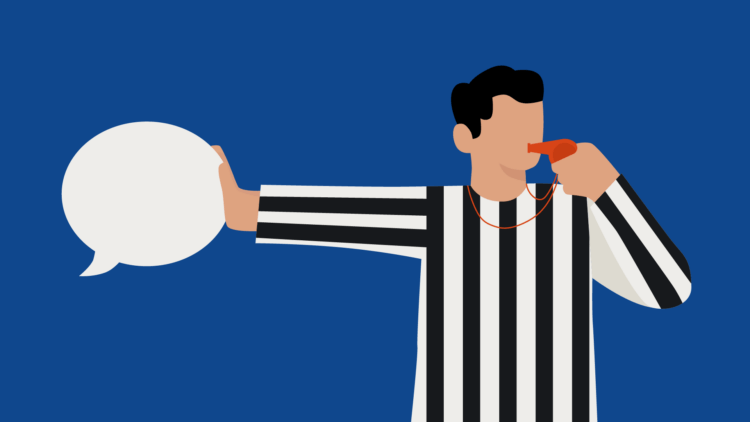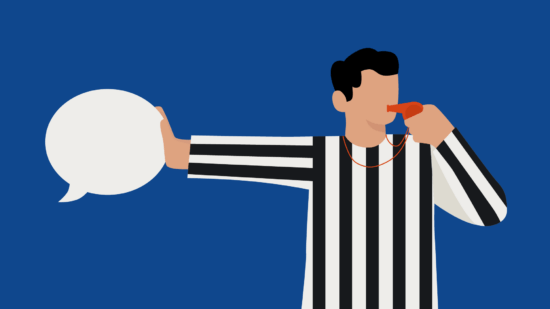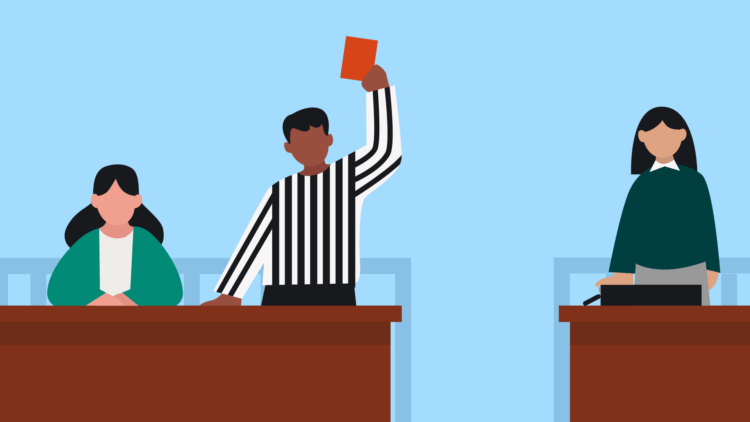“Your Honor, objection!”
Even non-attorneys have likely seen this scene in a TV show or movie, where a trial attorney objects to the opposing counsel’s question or the witness’s testimony. While objections may be less dramatic in real life, trial lawyers must undoubtedly understand how to use different types of objections in court.
In this guide, we provide a list of the most common types of objections, along with examples. We also address how and when objections should be used during trial. Finally, we cover how you can prepare for trial objections.
Disclaimer: This is not an exhaustive list of every objection, and the success of an objection is circumstantial. We can’t guarantee that your objection will be successful or that your objection is well-advised. The judge may overrule your objection in court.
Ready to leave the administration work to practice management software so you can focus more on trial preparation? Book a free demo to see Clio Manage in action!
Types of objections

What is an objection?
An objection is a formal protest by an attorney against evidence, testimony, or a question from the opposition, raised in trials, depositions, and fact-finding hearings. The key difference in trials is that the judge rules on objections, either sustaining (disallowing) or overruling them.
The following types of objections in court are generally based on the rules of evidence most common in American jurisdictions.
10 Common objections in court
1. Relevance
A relevance objection is based on the argument that the evidence is not relevant to the case. Evidence is only considered relevant if it has some value in proving a significant matter. Relevance objections seek to prevent jurors from being distracted or influenced by information that does not pertain to the legal matter at hand.
According to Rule 403 of the Federal Rules of Evidence, the court may exclude evidence, even if relevant, if its probative value is outweighed by the potential for unfair prejudice or other harms to the jury process. Accordingly, the judge must weigh these considerations when ruling on a relevance objection.
Relevance is often a particularly contentious area of objections. The outcome varies widely based on the circumstances, and the judge’s decision is often highly subjective.
Example of relevance
Bringing up the previous criminal history of a party to the case would likely be objectionable on relevance grounds. Even if this has some potential relevance to the case—for example, does the fact that your client was convicted of embezzlement 20 years ago make it more likely they defrauded the plaintiff in this case?—the judge could determine the information would unfairly sway the jury against your client.
See how Clio can help your law firm processes
Learn how firms level up their business with Clio.
See Clio in Action2. Leading question
This objection is raised when an attorney asks a question that suggests the desired answer or puts words in the witness’s mouth. Leading questions are prohibited during direct examination, although exceptions are made for background information. However, leading questions are allowed on cross-examination and for hostile witnesses or adverse parties.
Example of leading question
“Isn’t it true that the defendant was clearly drunk that night?” is an example of a leading question.
3. Compound question
Compound objections are raised when a question contains multiple inquiries, making it difficult to provide a clear and accurate response. The general remedy is to break up the compound question into multiple questions, so the witness understands what they are responding to.
Example of compound question
“Isn’t it true you visit the Looney Bar every Wednesday, and you were there until 2am that night?” is technically two questions in one.
4. Argumentative
A question can be objected to as being argumentative when it does not seek new information, but instead seeks to have the witness agree with an inference or conclusion. This objection can also be raised as “badgering the witness.”
Example of argumentative
An attorney asking “Do you expect the jury to believe someone who lives in your neighborhood can afford a luxury car?” is argumentative. This question does not seek information. Instead, it simply challenges the witness to attack their credibility.
5. Asked and answered
This objection is raised when an attorney asks a question that has already been asked and sufficiently answered. The goal of the objection is to prevent attorneys from asking the same question in different ways to elicit a different response.
Example of asked and answered
Examiner: “So you drove from Fresno to Las Vegas on November 8th?”
Witness: “That is correct”
Examiner: “So you arrived in Las Vegas on November 8th?”
Witness: “Yes.”
Examiner: “So you didn’t stay in Fresno on November 8th?”
6. Vague
When a question is unclear or lacks specificity, you can object on the grounds of it being vague. A vague question makes it difficult for the witness to provide a meaningful answer. Sometimes this objection is phrased as “ambiguous” or “vague and ambiguous.”
Example of vague
“Tell us about the incident.” Here, the opposing party may object, arguing that the question is overly vague and should be clarified.
7. Speculation
“Calls for speculation” is an appropriate objection to a question that requires the witness to guess or speculate on an issue where they do not possess direct knowledge. Attorneys can also raise the “speculation” objection if a witness is speculating with their testimony, regardless of the question they are responding to.
Example of speculation
If an attorney asks “What do you think the defendant’s intentions were?”, it is a clear call for specualtion.
8. Hearsay
Hearsay is an objection to evidence that relies on secondhand information—such as what the witness heard someone else say—rather than firsthand knowledge. The jury cannot assess the credibility of the individual making the statement and there is no chance for cross-examination, so this evidence is typically prohibited.
However, there are numerous exceptions to the hearsay rule, such as excited utterances and admissions against interest.
Example of hearsay
If a witness testifies, “I heard from a friend that the defendant was at the scene,” this is inadmissible hearsay unless it falls under a hearsay exception.

9. Privilege
You can object to any question that seeks information protected by a form of privilege, such as the attorney-client privilege. Since maintaining privilege is one of the ethical duties of a lawyer, these objections are usually sustained.
Example of privilege
The examining lawyer asks “What discussions have you and your lawyer had relating to the settlement of this case?”
10. Violation of best evidence rule
The best evidence rule applies when a party seeks to admit a writing, recording, or photograph into evidence. The rule provides that unless the original is unobtainable, the party must use the original item. You can object to evidence that doesn’t follow the best evidence rule.
Example of violation of best evidence rule
If a party attempts to introduce a copy of a contract when the original is available, this would violate the best evidence rule.
You may like these posts
Should you always object?
Assuming you have good grounds for making an objection at trial, should you always do so? There are reasons to be strategic about when you choose to object.
The ultimate goal of objections is to ensure your client receives a fair trial and has the best shot at winning the case. To a jury, constant objections could make it appear as if you are struggling with the case or have something to hide. Accordingly, if a certain question or answer is technically objectionable but would not significantly impact the case, you may wish to refrain from objecting.
There are also times when objectionable testimony from the other side would actually help your client. Let’s say, for example, the opposing party’s witness is going to provide testimony that is damaging to their case. In that case, it may be better not to object and let the jury hear the statement.
Learn step-by-step how to write a case brief: How to Write a Case Brief: The Ultimate Cheatsheet
Can you prepare for objections in court?
Jury trials are often unpredictable, so it is not possible to prepare for every potential objection. However, you can prepare ahead of time by knowing:
- The issues of your case
- The expected testimony of your witnesses
- The types of objections in court
Preparing for objections in court is far easier when you streamline the administrative aspects of your case, allowing time and energy to focus on case analysis and strategy.
Legal practice management software such as Clio Manage can do just that, taking care of case management, document management, and more. The legal calendaring aspect of Clio Manage can track events and deadlines based on calendaring rules for hundreds of courts across the U.S. This technology enables you to stay on top of your cases and remain mentally sharp at trial, so you can tackle surprises.
Final thoughts on types of objections in court
Any trial attorney must familiarize themselves with the types of objections in court and how to use them appropriately. In addition, they must anticipate how these objections are likely to come up in their case. Attorneys should consider the legal and factual issues, as well as the anticipated testimony of the witnesses, to help prepare for objections.
Clio Manage is practice management software that can take care of the administrative details of running a firm. Leaving the administration work to practice management software gives lawyers more energy to focus on trial preparation.
Ready to leave admin work behind and focus on trial strategy? Book a free demo of Clio Manage today!
We published this blog post in August 2023. Last updated: .
Categorized in: Uncategorized
See how Clio can help your law firm processes
Learn how firms level up their business with Clio.
See Clio in Action







